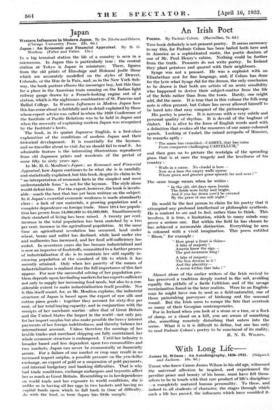Japan
'Western Influences in Modern Japan. By Dr. Nitobe and Others. (Chicago University Press. 22s. 6d.) Japan : An Economic and Financial Appraisal. By H. G. Moulton. (Faber and Faber. 15s.) lx a big terminal station the life of a country is seen in a microcosm. In Japan this is particularly true ; the central station at Tokyo is Japan in miniature. There, figures from the old prints of Hiroshige and Hokusai jostle those which are accurately modelled on the styles of Denver, Colorado, or the Rue de is Paix, and, as in the New York Sub- way, the bank partner elbows the messenger boy, but this time for a place in the American train running on the Indian light railway gauge drawn by a French-looking engine out of a station, which is the nightmare combination of St. Pancras and Balliol College. In Western Influences in Modern Japan how this has come about is faithfully and in detail explained by those whose expert advice was called in when the 1929 Conference of the Institute of Pacific Relations was to be held in Japan and when the necessity of explaining modern Japan was recognized by the Institute's hosts.
The book, in its quaint Japanese English, is a first-class explanation of the conditions of modern Japan and their historical development. It is essentially for the layman, and no traveller about to visit Jacan should fail to read it. An admirable feature is the interesting illustrations reproduced from old Japanese prints and woodcuts of the period of some fifty to sixty years ago.
In Mr. H. G. Moulton's Japan; an Economic and Financial Appraisal, how Japan continues to be what she is is carefully and statistically explained, but this book, despite its claim to be
an interpretation of economic facts in the simplest and most understandable form" is not for the layman. The style alone would defeat him. For the expert, however, the book is invalu- able —much the best that has yet been written on the subject. In it Japan's essential economic weakness is made abundantly clear : a lack of raw materials, a growing population and a complete dependence on foreign trade. Since 1914 her popula- tion has grown from 54,000,000 to 64,000,000. Simultaneously their standard of living has been raised. A twenty per cent. Increase in the total population has been matched by a two per cent, increase in the agricultural population. At the same time an agricultural revolution has occurred, land under wheat, beans and millet has declined, while land under rice and mulberries has increased, and her food self-sufficiency has ended. In seventeen years she has become industrialized and is now an importer of foodstuffs, committed to a further process of industrialization if she is to maintain her still rapidly in- creasing population at the standard of life to which it has recently attained. Only when her paucity of the means of industrialization is realized does the full importance of' this fact appear. For now the successful solving of her population pro- blem depends upon her finding markets for her exports sufficient not only to supply her increasing food needs, but also to a con- siderable extent to make industrialization itself possible. . Nor is this itself sound, for, as Mr. Moulton explains, the industrial structure of Japan is based upon the export of raw silk and cotton piece goods : together they account for sixty-five per cent. of her total buying capacity, and in conjunction with the receipts of her merchant marine—after that of Great Britain and the United States the largest in the world—not only pay for her import surplus but also make possible the heavy interest payments of her foreign indebtedness, and thereby balance her international account. Unless therefore the earnings of her textile trades and merchant shipping are fully maintained, her whole economic structure is endangered. Until her industry is broader based and less dependent upon two commodities and two markets, Japan can never be economically or financially secure. For a failure of one market or Crop may result. in an increased import surplus, a possible pressure on the yen-dollar
exchange, an export of gold or a suspension of gold payments, and internal budgetary and banking difficulties. That is why had trade conditions, exchange embargoes and boycotts affect her as much as Great Britain. Resembling us in her dependence on world trade and her exposure to world conditions, she is unlike us in having all her eggs in two baskets and having' no capital funds upon svhich _to fall back in_time of difficulty.
As -with the land, 'go liere-Japan has margi-W *. '








































 Previous page
Previous page